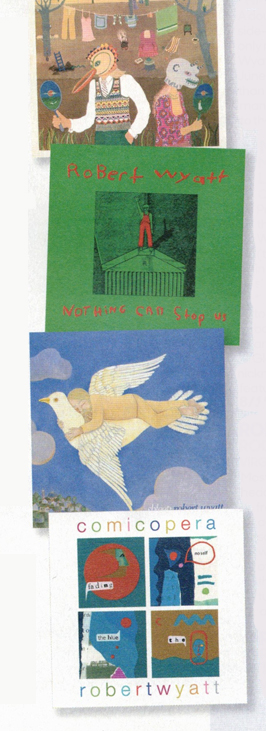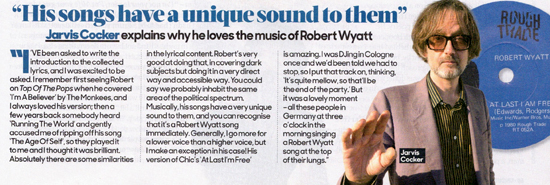| |
|
|
 "I'm so somewhere else now..." - Uncut N° 274 - March 2020 "I'm so somewhere else now..." - Uncut N° 274 - March 2020
Many happy returns, ROBERT WYATT!
As he celebrates his 75th birthday, a national
treasure invites Uncut round for a chat. Over
carrot cake, Tom Pinnock hears tales of the
Soft Machine, Pink Floyd and Wyatt's own
wide ranging musical appetites. But will he
ever make new music again? "Occasionally
I hit the piano and go, 'Ah, that would be
good, I must remember that!'..."
Photo by JEREMY GRAYSON
|

|
HE tea is made, the carrot cake is ready to be sliced and Robert Wyatt has just slid his electric wheelchair under the edge of the dining table when he realises he's forgotten the cake knife. Uncut offers to fetch it from the kitchen.
"No, it's all right," Wyatt says, reversing his chair. "I can get it without standing up, mate."
He returns with a huge knife - "It's a bit Agatha Christie" - and proceeds to slice the cake. "It's great, I can sit anywhere in town," he adds, detailing one of the advantages of being wheelchair-bound, "while everyone else has to sit on a bench. It's a bit toytown round here, like one of those imaginary places in train sets, but that's no bad thing."
The town in question is Louth in the Lincolnshire Wolds, where Wyatt and his wife Alfreda Benge have lived for over 30 years. Their house, situated right in the hilly centre, is deceptively large, its ground floor stretching back through room after room. The space facing the street is Wyatt's music room, complete with a baby grand piano and woven Tunisian wall hangings, while other areas are decorated with prints and paintings by the likes of Oblique Strategies co-creator Peter Schmidt. While Wyatt might have retired from making his own records after 2oo7's Comicopera, music still plays a huge part in his life and Benge's: indeed, when Uncut arrives, Who Is In Love?, by Iranian singer Shahram Nazeri, is blasting through the large dining room stereo.
"A friend of mine just came back from the Iranian film festival," Wyatt explains, adjusting his yellow-and-pink glasses. "Apart from being irritated that she couldn't wear her designer clothes there, she brought back some records for me. What I really like is Iranian singing, it's just beautiful, so I've been playing this."
On January 28, Robert Wyatt turns 75. It's a milestone he didn't expect to reach. To discover how retirement is treating one of our musical national treasures, Uncut has travelled to Lincolnshire for an afternoon with the singer, songwriter and musician; during our time in Louth, Wyatt regales us with tales of Soft Machine and The Wilde Flowers, of Daevid Allen, Kevin Ayers, Nick Mason and Brian Eno, of hanging out with Robert Graves in Majorca, and of his own shape-shifting musical passions. He explains how he and his wife's health problems are inevitably changing their lives, but also why putting together a forthcoming book of their lyrics for Faber has revitalised them.
"It's a great thing that's happened in terms of tidying up who we are, me and Alfie. They gave us a couple of months to sort it out, with Alfie's stuff too - we're doing it together. Alfie keeps diaries which is lucky, but we had to remember the situations in which certain records were made, which was a good exercise for elderly, forgetful people. The timing was fantastic - just as we were finishing the book, Alfie started to get seriously ill to the point where we couldn't have carried on doing it. She's being taken care of, having operations and scans, and she will be for months. We'll see how that goes."
Wyatt's son Sam is sleeping upstairs. He's a nurse at a nearby hospital, and often stops in at their house to rest after night shifts. It's been more than helpful, considering their health issues, to have him there, and Wyatt seems to take huge pleasure in spending time with him.
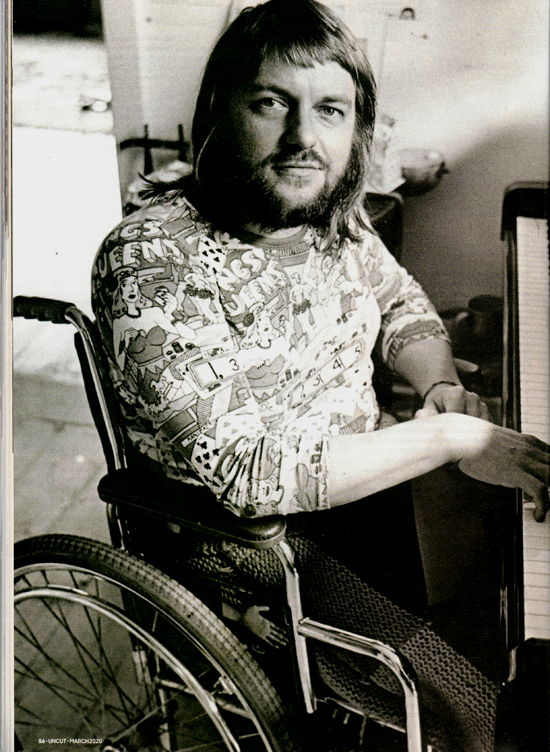 |
"I was very lucky": At the piano soon after the release of Rock Bottom, september 1974 |
"By the time he was 19 and he'd delivered his first baby, I thought, 'He's already done something much more important than I will ever do in my life.' I wasn't there for him as a dad, but he doesn't seem to be resentful at all. It's great having him here because, well, he's a nurse, but he's also very kind and very clever. You can't look anywhere in the house without seeing something he fixed.
"One of the things that changes as you get older is the past," Wyatt adds, pondering life as he approaches his 75th birthday, free of alcohol or cigarettes but as lucid, frank, modest and wryly funny as ever. "It's like you're born in a village at the bottom of a valley and it's all you know. Then your life is spent climbing up this mountain and you're looking back down, and you see your village is just one of many villages. Then you see there's a whole landscape and you see the horizon - you can still see your little village, you know where it is, but you're seeing it from this strange height. It just looks so different. That was one of the weirdest things about putting these lyrics together for the book. 'Did I really write that?'"
Cutting another slice of cake, Wyatt gestures to Uncut's recording gear. "Are you sure you're getting this? John Walters came up and recorded me for the BBC once, and none of it came out. I don't mind, I can just do it again. But the alarming thing is I always seem to say something quite different to the previous time."
UNCUT: It sounds like you never imagined yourself getting to 75.
WYATT: Absolutely not, no. As far as I'm concerned, every surge of activity in my life was a sprint, which is a particular kind of energy. But then I'd get to the end of the sprint and fuck me, there's another one! If only I'd have known that, in retrospect, it was a fucking marathon! Nobody told me - if they had I'd have taken care of myself better and paced myself, instead of living in a panic all the time.
In 2014, you told Uncut that you'd retired from music. Your last few albums were so well received, I guess it was the perfect run to go out
on?
One reason I stopped was that my dad had died long before my age, so I didn't know how to behave older than that. But I did find that [2007's] Comicopera was exactly how I wanted it to be, and it was partly thanks to this great engineer Jamie Johnson; I also got Alfie to do half the [lyric] writing. There were also the people I got to play in my imaginary band, like Annie Whitehead, Phil Manzanera, Paul Weller and Yaron Stavi. The trouble with proper groups is I can't follow and I can't lead, so I'm a bit stuck really.
|
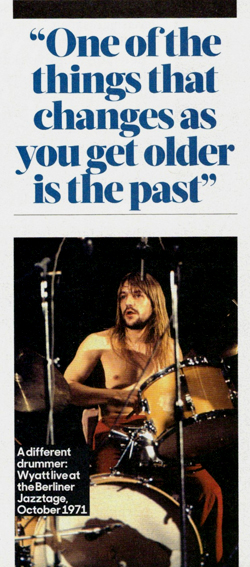
|
Obviously, there's some great Soft Machine and Matching Mole stuff, but it does seem like you flourished, creatively, almost immediately after you had your accident and could no longer play drums in a group.
It's tough being in a band. All that diplomacy, and testosterone-fuelled young men. I actually really liked doing a few records entirely on my own, like [1991's] Dondestan. Somebody once said to me, "It's amazing you could do all that on your own." And I said, "You're amazed?! I'm fucking stunned! How the fuck did I do that?" I always just tried to make a good record, by any means I could; but I got to the point where I was trying to do something different, then I'd listen to it and think, 'Oh, it's another fuckin' Robert Wyatt record, isn't it? How can I break out of this cage?'
Many people would be quite happy to hear you in that particular cage.
Well, I just stopped in the end.
Do you miss it?
It's hard to say. I'm so somewhere else now, because me and the missus have our life now and it's just not built around making records any more. I'd rather sit around chatting with Alfie, really. If I'm thinking about happy memories, I wouldn't remember this gig or that gig - but what I do remember is getting into Alfie's little car, getting the wheelchair in the back, going off down the road and stopping at those little caravans where you can get a fried egg sandwich, and just sitting there for a bit in the layby. Alfie nips out and gets a sandwich and a cup of tea, we'll open the windows, have a fag. They're moments of utter happiness that I remember, and I feel quite tearful about it now, because it will never happen again.
They're the most important things in life, tough, aren't they, love and companionship?
Getting older, the saddest thing I've had to give up is going down to London - I was invited to George Galloway's book launch, and I couldn't go. I think they thought it was because I didn't want to go, but I would absolutely have loved to. He's a brilliant man. Of course, not everybody thinks so - but I do. Then Nick Mason asked me if I could do an encore with A Saucerful Of Secrets singing "I'm A Believer", and I thought, 'That is a wonderful idea!" But I had to say no. I felt quite tearful about that too, because I would have loved to be with him again on a big occasion.
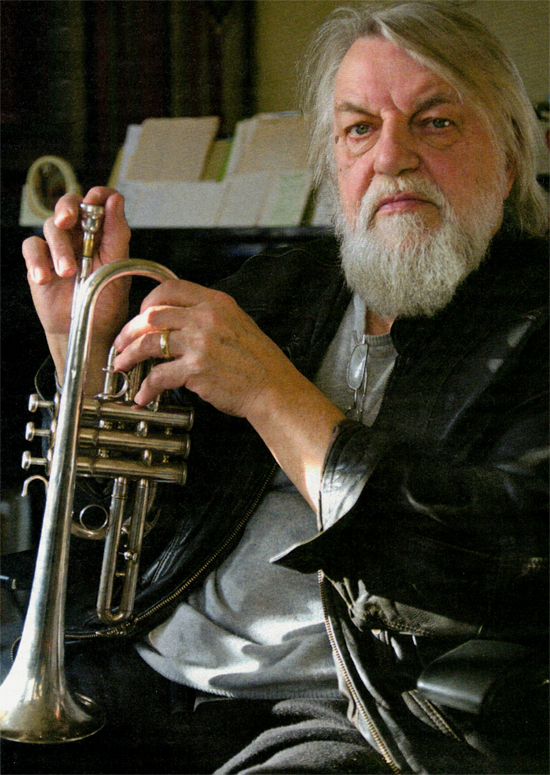 |
Wyatt in his music room in Louth, February 16, 2014 |
Couldn't they at least have sent a car up to take you London, though?
They offered all that, but I just can't. Being quite so disabled as I have become really does sometimes mean "disabled". It's nice that people don't think that, though, that I don't come across first and foremost as a cripple! [laughs] When we first met Ian Dury, his band were quite misshapen, the drummer was on a crutch, so Alfie jokingly said, "You could have Robert in your group." And Ian said, "Got enough fuckin' cripples in the band already!" He had a point. It would have been a fuckin' business carting us lot about. Alfie's imminently 80, and she needs physical comfort and peace - and I just don't do things without Alfie. You might think, 'What's the point of living older?' Well, one thing having lived this long is that we have this bunch of stuff we've done - if you look downwards from one end [of my years] to the other, it seems like a lot of stuff, more than I realised. So putting this book of lyrics together has been a good feeling, and a good mental exercise. I'm glad we've lived long enough to do it, frankly.
How did you find the process of looking back over your work?
It caused quite a few sleepless nights. When I first tried to get some stuff together, I thought, 'I've only got enough for about 20 pages, this isn't gonna work.' I was thinking of Van Morrison - in his book he just put in 100 long things he'd done, and I was thinking, 'Bloody hell...' I do a lot of other people's tunes, and if you pick out the ones that I wrote without Alfie, it's not much.
You found enough for more than 20 pages, then?
Alfie and I are doing it together, and we also picked some funny little wordy things we'd done. There's a bit of annotation too. All my stuff was in these messy notebooks, but I think I got everything - oh, apart from one short lyric, a take on "Freight Train": "Coltrane, Coltrane, going so fast/Wonder how your breath can last/I don't know what mode you're in/They all sound Greek to me." I forgot to put it in the book! So now you've got it [laughs]. When I made those records, everything went into each one, and that was the end of that journey. It wasn't played live.
That was quite a turnaround, considering the amount of gigging you did before your accident.
An amazing amount! That was a whole life there, even two. Before '68, we were this English grammar school band, a bit shaky, but we did our thing. That was a really friendly little band, with Daevid Allen and Kevin Ayers, just friends. We were also not like each other, which is why it couldn't have lasted. But to be young with, they were great. The early years playing in bands like The Wilde Flowers was the most fun - if I'd only ever done that, I'd be quite happy.
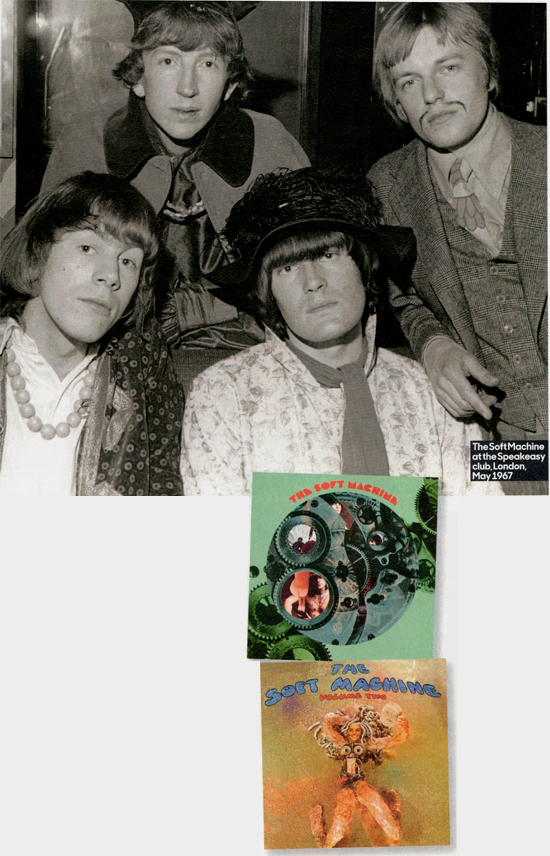 |
Once Soft Machine took off,
though, you were playing
all the time, from UFO and
Middle Earth to touring
America with Jimi Hendrix.
Playing the gigs required such
concentration, listening to
each other and keeping it all
flowing, that I'd hardly register
where we were, exactly.
Talking of places like UFO, I
remember that us and Pink
Floyd and used to watch each
other when we played the
same venues, and there was
just total mutual respect - you
couldn't be rivals when you
were trying to do completely
different things. I'm just
grateful to the brilliant musicians I got to play for.
Supporting Hendrix was very scary - if you're in an
aircraft hangar with 5,000 Texans in it, you've gotta
fuckin' get on with it and not stop until your half-hour
is up. But it meant we came back to the UK really able to
hit the ground running.
You'd lost Kevin Ayers somewhere along the way, though...
|
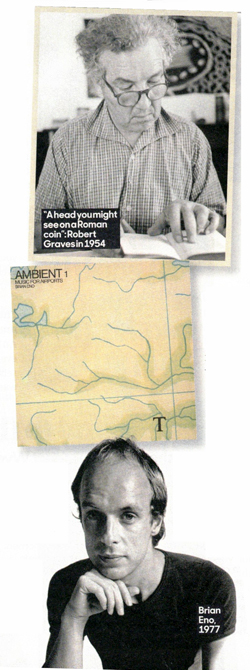
|
Yeah, without Kevin, of course. He'd had enough, and quite rightly he wanted to go and write his songs. I do get upset when he'd say later that he "wasn't technical enough" for the band - he was very good! I loved drumming with his bass playing, I loved his deep sprechgesang singing, a good contrast to mine, and I loved doing his songs.
When did everything start for you? I
imagine it must have been a huge moment
when Daevid Allen first turned up to lodge
with your family in Lydden.
I'd already got
into a lot of music through my brother Mark -
he brought home the first Mingus and Ornette
Coleman - but Daevid showed me how to live
another way. Lydden was a little village then,
there was just a post office, a few houses, a pub,
and Daevid used to take his dog out for a walk, up
and down... his dog being a tin on a long string.
I was very impressed by that. When I first played
music with Daevid, it was jazz and poetry. He
would read out this poetry and Hugh Hopper and I
would fiddle-fiddle, toodly-boodly behind him. I was at school
and doing worse as the years went by, but one of the people
who said "you don't have to approach life like that" was
Daevid. He was the person who was doing what we assumed
Dadaists did, which was inventing their own lives, writing their
own scripts. That became a way out for me.
Did you already know Robert Graves, a similar free spirit, when you met Daevid?
Oh yeah, I think so. My parents had been in Majorca before the war, and I visited him there in the early '6os, and he was wonderful, a kind man, a patrician. He had a head you might see on a Roman coin, and his family were great to me. They still are. Robert had a little cottage on his plot halfway down the mountain, and he let me stay there. I was invited up to the house occasionally to hang around, but if you dined with Robert you had to do something, a turn or a poem or a joke or a song. Robert's son-in-law Ramon and I would sit opposite each other and imitate timbales for about five minutes! Simple things about living there were so exotic to me, like fig trees with great purple figs hanging there. But you didn't bite into them, because they'd probably got wasps inside! A perfect symbol of life itself. Kevin came with me once too, and I know that Kevin and Daevid went out there together too, and wrote some great songs there, which should have been the basis of the first Soft Machine LP, but it never got made. I think it would have been very good.
Were you aware of any of Graves' famous "muses" back then?
The muse thing was a bit over my head at the time. Most of that stuff is just retrospective understanding of who he was. It sounds a bit old-fashioned, doesn't it? Alfie doesn't like this muse thing - sometimes she gets called my muse: "I'm not your fuckin' muse. I'm Alfie, fuck off!"
That sounds a little like some of Alfie's lines on Rock Bottom - "I'm not your larder/I'm Alife your guarder..."
There was a feeling of relief about that record. It was the first time I hadn't had to be a drummer, so I could just take charge of the whole record. I was very lucky, because I had nearly a year to write it in my head and not have to do anything else. People don't think of it as a luxury, but if you're in hospital and someone is making your bed, turning you over, everything, then it is possible, with the scraps you had before, to conjure up 40 minutes of music and go over and over it in your head. I'd never had the opportunity to do that before. I still wasn't taking myself that seriously, though, I was still a bit "that'll do", which has always driven Alfie crazy. "Robert, that will not do. Do it again!" Another good thing was that there was no pressure, people didn't know if I was even going to live. I could have any combination of musicians on each track - like Fred Frith, Gary Windo, Mongezi Feza, Laurie Allan, Richard Sinclair. It was a wonderful feeling.
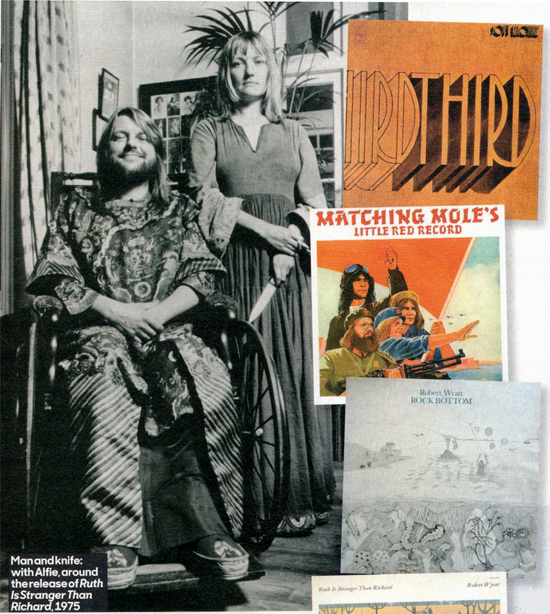
One of your collaborations that's sometimes overlooked is your work on Brian Eno's Ambient 1: Music For Airport. How did that come about?
I was first introduced to him by [Matching Mole bassist] Bill MacCormick; he played on our song "Gloria Gloom" and then I did some stuff on a terrific record called Taking Tiger Mountain (By Strategy). I love his singing, and his songs and his words. When some elephants get rejected from their herds, they sometimes get together in a rogue elephant herd - so I think in a sense me and Brian were kind of rogue elephants. We were free, because we weren't in groups. I didn't know about the "music as wallpaper" theory then - Brian just said, "Can you play some piano?" I played and played and then he took out a section that he thought could repeat ad infinitum, and then he did everything else you hear on it. Working with Brian is great, because we don't have the same music in our heads, but his sheer presence makes me do things differently in the studio, and it's just great talking about music, politics, everything.
You still seem so fired up by music, it's hard to imagine that you're not coming up with new ideas.
I sing to myself. Occasionally I hit the piano and go, "Ah, that would be good, I must remember that!" But it's quite a cumbersome business, recording and making records. Now I'm investigating other music, a lot of it made by people who are demonised, politically.
How do you mean, demonised?
Well, if I'm sad about anything now, being 75, it's that colonialism hasn't disappeared at all; how it's done has just got more subtle. This thing of fake benevolence, like, "Oh, we want to rescue you from your tyranny, and then you can just live in a happy land of McDonald's and Coca-Cola with us..."
|
|
|
It reminds me of the spread of Christianity: "Don't worship your false idols, they're terrible. Witch doctors? Dreadful people. You want our Jesus, here's the Bible - now get on with the work." Our economic systems are the new Bible, to which people are meant to aspire, and relinquish their old gods. It's the same old trick. On YouTube I now look out for ways to reverse the demonisation of people we're told to hate or feel sorry for.
What have you been into recently?
I've found some lovely clips of school choirs in Syria, it's a joy to watch them. There's a saxophonist called Sophia Tyurina - they like child prodigies in Russia, but this girl's really something. Traditional Moldovan dance music is my current favourite thing - it's a knockout!
You're exploring hidden corners of the world from
Louth!
That is my sense of adventure now, these people are taking me somewhere else. It's so much more fun than making records now. I still feel like the same person, but I'm looking for something else.
Robert Wyatt and Alfreda Benge's collected lyrics will be published by Faber this year
|
|










